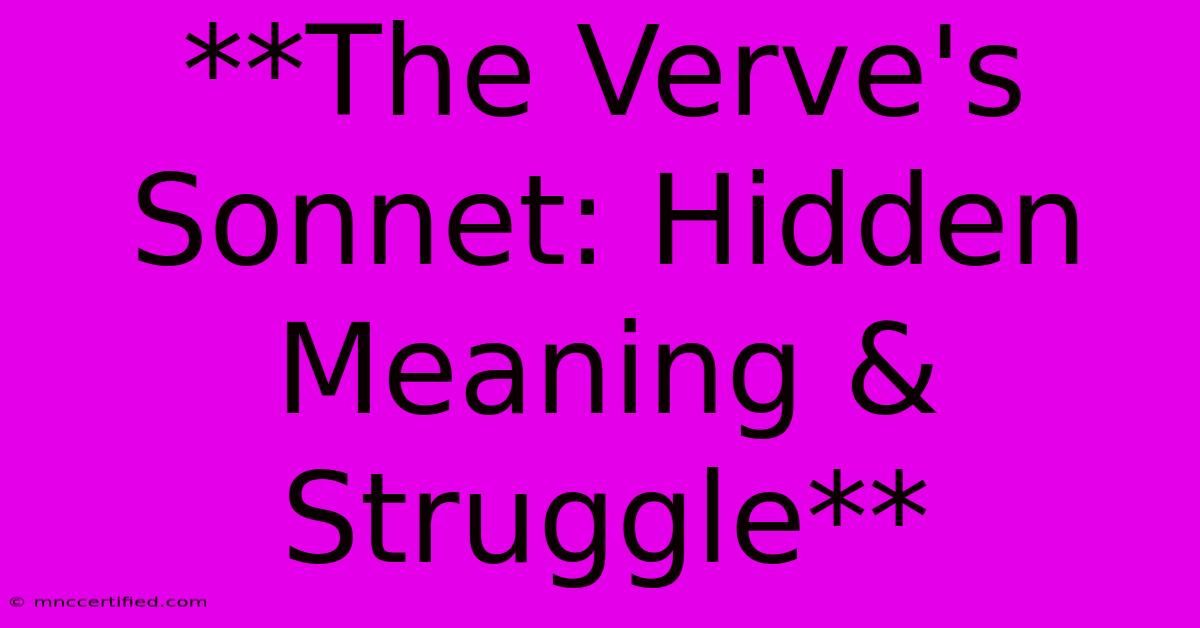**The Verve's Sonnet: Hidden Meaning & Struggle**

Table of Contents
The Verve's Sonnet: Unveiling the Hidden Meaning & Struggle
The Verve's "Sonnet" is a haunting and evocative masterpiece, deeply layered with symbolism and emotion. Beyond its captivating melody and Richard Ashcroft's powerful vocals lies a story of struggle, self-discovery, and the search for meaning in a world rife with chaos. This article dives into the song's hidden depths, exploring its lyrical themes and the band's own struggles during its creation.
A Journey Through Darkness and Despair
"Sonnet" is a melancholic exploration of the human condition, navigating themes of loneliness, disillusionment, and the struggle for self-awareness. The opening lines, "Lost in a world that doesn't care/Lost in a world that's full of despair," immediately set the tone for the song's melancholic narrative. This sense of isolation is further emphasized with lines like "No one to hear me cry/No one to catch me when I fall," highlighting the protagonist's feeling of utter abandonment.
The lyrics also delve into the complexities of the human psyche, struggling with internal conflicts and battling against inner demons. Lines like "Trying to find the truth inside myself/Trying to find the strength to carry on," reflect the protagonist's relentless search for self-understanding and purpose in a world that seems to offer little guidance.
Symbolic Interpretations and Layers of Meaning
The song is rich in symbolism, leaving room for multiple interpretations. One prominent symbol is the "city" - a metaphor for the harsh and unforgiving reality of modern life. This urban jungle, filled with "hollow hearts" and "empty faces," represents a world devoid of genuine connection and empathy.
The repeated phrase "I'm a sonnet" is both literal and metaphorical. It signifies the protagonist's attempt to express their inner turmoil through art, using words as a vessel for their emotions. This connection to art echoes the band's own artistic struggles during this period.
The Verve's Internal Turmoil and Artistic Struggle
"Sonnet" was written during a tumultuous period for The Verve. Internal tensions within the band, fueled by drug addiction and creative differences, threatened to tear them apart. The song reflects this turmoil, with the protagonist's struggle for self-discovery mirroring the band's own battle for artistic integrity.
The song's lyrical themes also reflect the band's evolving musical direction. "Sonnet" marked a departure from their previous psychedelic sound, showcasing a more mature and introspective approach. This transition, while successful in capturing the zeitgeist, was met with resistance from some fans.
A Legacy of Emotion and Artistic Vision
"Sonnet" remains a powerful and enduring testament to The Verve's artistic vision. Despite its melancholic tone, the song offers a sense of hope, suggesting that even in the darkest of times, there is a possibility for finding meaning and connection.
The song's lasting legacy lies in its ability to resonate with listeners on a deeply personal level, offering solace and understanding to those struggling with similar themes of isolation, despair, and self-discovery. "Sonnet" stands as a testament to the power of music to transcend personal struggles and connect with universal truths.
Keywords: The Verve, Sonnet, Richard Ashcroft, lyrics, meaning, symbolism, struggle, isolation, despair, self-discovery, internal conflict, city, metaphor, artistic vision, band, music, emotional, melancholic, haunting, evocative, powerful, enduring, legacy.

Thank you for visiting our website wich cover about **The Verve's Sonnet: Hidden Meaning & Struggle**. We hope the information provided has been useful to you. Feel free to contact us if you have any questions or need further assistance. See you next time and dont miss to bookmark.
Featured Posts
-
Wembanyama Explodes For 50 Points Thrills Fans
Nov 14, 2024
-
The Verves Sonnet Hidden Meaning And Struggle
Nov 14, 2024
-
Chanel Maya Banks Safe Lapd Investigation Continues
Nov 14, 2024
-
Court Sara Sharifs Death My Fault Says Father
Nov 14, 2024
-
Samantha Harveys Novel Wins Booker Prize
Nov 14, 2024